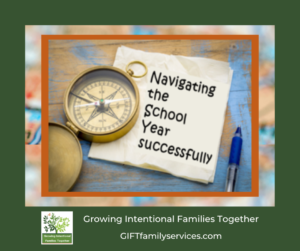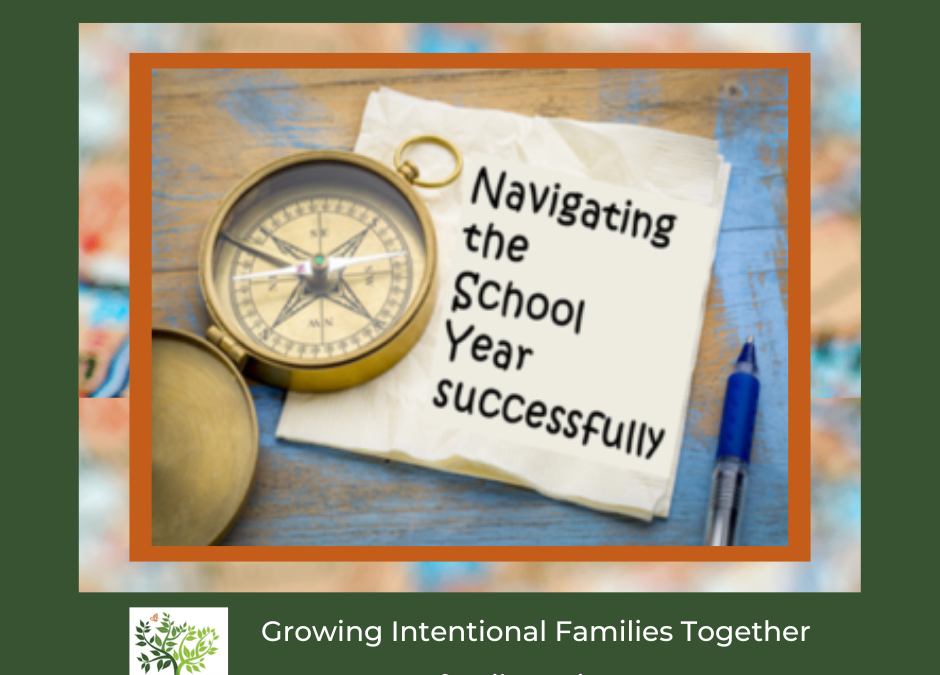 School Bells Ring Soon. Get Ready! Set Goals.
School Bells Ring Soon. Get Ready! Set Goals.
In my state, schools will reopen in two weeks. Other states will soon do the same. So, this got me thinking about how we can help you—and your children—set the stage for success.
Parents and students all hope for a good year, one that is filled with learning—both academic and relational—and grows their ability to be in the driver’s seat of their lives. (After all, the point of parenting is to put ourselves out of a job: to raise kids that can succeed on their own.) So, how do we accomplish this vital goal? Operating purely on intuition is not enough.
You need a map
Your map app will show the route you intend to take and it will display your departure point and your destination. The shortest route would simply draw a straight line from point A to point B. But life is never that linear or that free from unexpected obstacles and delays. You must plan for contingencies, pack supplies for “emergencies,” and draw out alternate routes “just in case.”
FIRST, understand and validate their goals, dreams, and motivations
Then you can discern how you can help them define, refine, and accomplish them. When they feel you are in their corner, they will be more open to your input regarding some goals that might be willing to add to their list. Be sure your children have a voice in the goal-defining and setting because if they are not interested in the goal, invested in the goal, they will not work to achieve it.
The best way they can become skilled at goal-setting is to practice identifying, setting, and working toward a goal that they care about. What skills will they need to develop in order to achieve their stated goals? Clarify what those are.
THEN discuss the goals to which YOU would like them to commit.
What skills do you believe would be useful for them to acquire? Share your reasons for why you think they are important. Clarify what you would be willing to do to support them in the process.
Talk about the behaviors you wish to see. Determine how you will encourage and reinforce these behaviors. How will you model the same behaviors? How will you identify and meet the unmet needs that are behind any negative behaviors? By the way, it is good to remember the distinction between discipline and consequences. The first aims to teach; the second aims to punish.
What skills and habits do you want them to develop?
- Timeliness
- Getting themselves up in the morning
- Completing homework
- Putting forth full effort
- Learning from their mistakes
- Playing a sport or instrument
- Being physically active
- Managing tech time
- Expanding their circle of friends
- Being compassionate
- Helping others
- Showing respect for teachers
- Creating a school/play balance
- Being accountable for their actions and choices
- Admitting errors
- Speaking up for themselves
- Asking for help and support
- Identifying their personal strengths as well as growth points
- Seeing school as a tool that helps them accomplish their life goals
Determine responsibilities and clarify responsibilities—theirs and yours.
Put these responsibilities in writing, for example,
- Mom will pick me up after band and
- I will practice 30 minutes each day.
Develop systems that will support success and reduce nagging. For example,
- Set reminders in your phones.
Establish completion dates or times. For example,
- I will practice my clarinet before dinner.
- I’ll place my backpack by the front door before I go to bed
What habits will help them achieve these goals?
- Good nutrition,
- Adequate rest,
- Recreation
- Making time for self-reflection
- Exercise
- Standing up for themselves
What values do we want them to embrace?
- Confidence, competence, courage, resilience,
- Persistence, compassion, service, open-mindedness,
- Curiosity, conviction, self-discipline, delayed gratification,
- Morality, kindness, generosity
- Awareness, creativity, forgiveness of others and self,
- Respect for self and others, truth-telling and truth-seeking
When you demonstrate intentionality about your personal and family goals you show your children that planning is essential for success. It doesn’t just happen. Planning is a basic step in your approach to goal accomplishment. Intentionality and planning also reduce the chaos of living with a seat-of-the-pants, handling brush fires as they come. Having a life blueprint alerts us to digressions that lure us off track.
Decide if something is a welcome diversion or if it is a distraction we choose to avoid. It’s important to note that our expectations for our children need to be developmentally realistic. Staying “attuned” and in communication with our kids is our primary goal. We want to nurture the child before us and not expect him to be the embodiment of a “fantasy child” that exists only in our imagination.
Listen to our podcast featuring Adoption Attuned Parenting
Growing happier, healthier adoptive families

Read these award-winning books written by our coaches.




